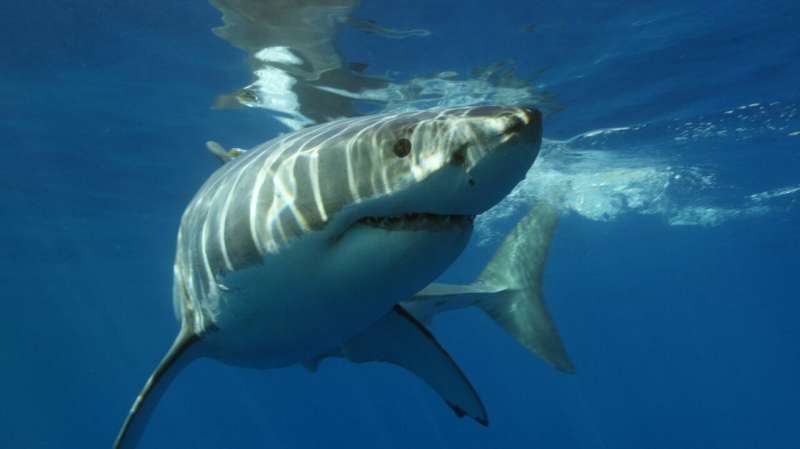This article has been reviewed according to Science X's editorial process and policies. Editors have highlighted the following attributes while ensuring the content's credibility:
fact-checked
proofread
Conservation actions for South Africa's white shark population now a matter of urgency, say researchers

A group of marine biologists specializing in shark ecology, genetics and fisheries have challenged the findings from a recent study suggesting that South Africa's white shark population has not decreased, but simply redistributed eastwards to flee predation from orcas.
In September 2023 the article titled "Decline or shifting distribution? A first regional trend assessment for white sharks (Carcharodon carcharias) in South Africa" was published in the open access journal Ecological Indicators.
This was followed by two articles in the popular media—one in Nature titled "Orcas blamed for missing great white sharks" and another in The Conversation Africa titled "South Africa's great white sharks are changing locations—they need to be monitored for beach safety and conservation."
In a rebuttal article published in the same journal recently, titled "Uncertainty remains for white sharks in South Africa, as population stability and redistribution cannot be concluded by Bowlby et al. (2023)", the group of concerned marine biologists highlight several issues with the methods and inferences made in the study mentioned above, and argue that the data, as currently analyzed and interpreted, cannot support the claims made about population stability, nor redistribution, of South Africa's white sharks.
Dr. Enrico Gennari, director of the Oceans Research Institute and lead author, says they felt obliged to raise these concerns given what it means for management, "If the white shark population is stable, there is no need for concern. However, if the declines in white shark sightings seen in former hotspots are actually representative of the population, then conservation action is urgently needed."
Firstly, regarding the claim that South Africa's white shark population has migrated eastwards, they raise two objections. The first objection has to do with the presentation of the two datasets in the 2023 study, and that one cannot infer that an increase in the number of shark sightings in one spot, in this case, Algoa Bay, is directly comparable to a reduction in shark sightings in another spot, such as False Bay.
"Putting it simply, a decrease of let's say 80% from 100 individuals at location A cannot be the same as a 80% increase from 10 individuals at location B," they write.
A significant increase in shark sightings in one spot could be due to a variety of reasons, including improved technologies such as the use of aerial drones. A 2022 study, for example, identified a 357% spike in the use of aerial drones in South African recreational fishery since 2016.
Other potential factors that could have contributed to an increase in the number of white sharks in Algoa Bay include the establishment of Marine Protected Areas around Algoa Bay in 2004 and the completion of a new port in 2006.
Recently, in the Western Cape, the number of shark sightings has declined to fewer than 10 per year.
"If the entire population was indeed regionally stable and those observed simply moved from East to West, one would have expected the number of white sharks in Algoa Bay to be tenfold higher," they write.
Secondly, with regard to the claim that the supposed white shark redistribution eastward was driven by shark-eating orcas, they point out that the onset of white shark declines in False Bay (2012/13), Gansbaai (2013/14) and Mossel Bay (2015) predates the first appearance of those orcas in False Bay and in Gansbaai in 2015, and in Mossel Bay only in 2017. In other words, the alleged cause cannot appear two years later than its effect.
"While we agree that orcas have likely influenced white shark numbers and behaviors, and at least temporarily displaced many from their historical aggregation sites, the data as currently presented do not suggest that orcas are the primary driver of the declines in white shark observed in the Western Cape," they write in the article.
Dr. Sara Andreotti, a marine biologist in the Department of Botany and Zoology at Stellenbosch University and one of the co-authors, says they are worried about the effect of the narrative on conservation efforts, "There is no evidence of the hundreds of white sharks counted in False Bay, Gansbaai, and Mossel Bay ten years ago to be aggregating now somewhere else along the South African coastline."
"Our concern is that unsupported claims of population stability could jeopardize conservation actions urgently needed for white sharks," she warns.
The group of concerned marine biologists urges authorities such as the Department of Forestry, Fisheries and Environment to take a precautionary approach in light of the declines in white shark sightings from their historical hotspots, the consequent negative impact on South Africa's ecotourism economy, the reduction in sightings of large mature white sharks, both in the Western and Eastern Cape, the very low genetic diversity of this population, the historical and current unsustainable levels of white shark deaths from the lethal shark control program of the KwaZulu-Natal Sharks Board, and the newly exposed white shark deaths by a coastal shark longline fishery in South Africa.
"Our paper highlights the importance of robust, transparent scientific inquiry in guiding conservation efforts while taking a precautionary approach. It also serves as a critical checkpoint, urging us to re-evaluate and reinforce our commitment to preserving South Africa's white shark population given the critical role these apex predators play in marine ecosystems and in the economy of South Africa," they conclude.
More information: Enrico Gennari et al, "Uncertainty remains for white sharks in South Africa, as population stability and redistribution cannot be concluded by Bowlby et al. (2023): "Decline or shifting distribution? a first regional trend assessment for white sharks (Carcharodon carcharias) in South Africa", Ecological Indicators (2024). DOI: 10.1016/j.ecolind.2024.111810
Provided by Stellenbosch University




















